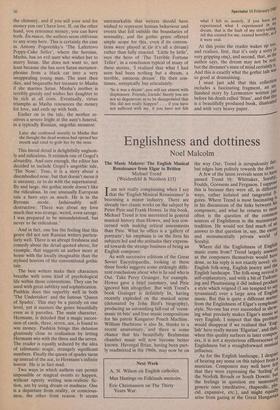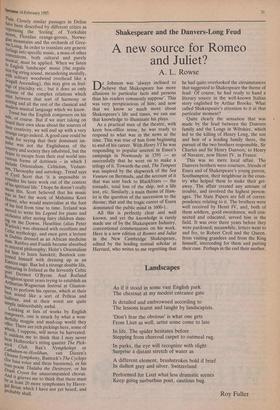Englishness and dottiness
Noel Malcolm
The Music Makers: The English Musical Renaissance from Elgar to Britten Michael Trend (Weidenfeld & Nicolson £15)
T am not really complaining when I say ithat the 'English Musical Renaissance' is becoming a minor industry. There are already two classic works on the subject by Peter Pirie and Frank Howes. In this book, Michael Trend is less interested in general musical history than Howes, and less con- cerned with making critical assessments than Pirie. What he offers is a 'gallery of portraits'; his emphasis is on the lives his subjects led and the attitudes they express- ed towards the strange business of being an English composer.
As with successive editions of the Great Soviet Encyclopaedia, looking at these three books suggests some strikingly diffe- rent conclusions about who is In and who is Out. Take Percy Grainger, for example. Howes gave a brief summary, and Pirie ignored him altogether. But with Trend's book Grainger is definitely In, having recently exploded on the musical scene (detonated by John Bird's biography), producing an astonishing fall-out of 'room- music tit-bits' and free-music compositions for his patent Kangaroo Pouch Machine. William Hurlstone is also In, thanks to a recent anniversary, and there is some chance that his beautifully Brahmsian chamber music will now become better known. Havergal Brian, having been part- ly readmitted in the 1960s, may now be on
the way Out; Trend is scrupulously fair' but edges him politely towards the door. A few of the latest revivals seem to have passed Trend b': Whittaker, Sorabll' Foulds, Goossens and Ferguson. I suPlOc this is because they were all, in different ways, rather isolated and tangential gures. Where Trend is most fascinating !s in his discussions of the links between his composers; and what he returns to [Os!, often is the question of the comirMi' sources of Englishness in the mainstream tradition. He would not find much of all. answer to that question in, say, the exotic and monumentally private world 0' Sorabji. Where did the Englishness of English music come from? Trend largely answers as the composers themselves would have done, so his reply is not exactly novel: viz' English folk-song, English poetry and the English landscape. The folk-song revival, is self-explanatory, and with a bit of Tudor's' ing and Phantasising it did indeed produce a style which reigned (I am tempted to say tyrannised) over a large area of English music. But this is quite a different matte! from the Englishness of Elgar's symphonic style. No-one has ever succeeded in shove ing what precisely makes Elgar's music 5° very English; I suspect that this problem would disappear if we realised that 'Eng- lish' here really means `Elgarian', and that, when this quality surfaces in later comPosi ers, it is not a mysterious efflorescence Englishness but a straightforward musical influence. As for the English landscape, I despair of hearing any sense on this subject from a musician. Composers may well have fell that they were expressing the 'feeling' °: the Norfolk Broads or South Downs; but the feelings in question are immensely generic ones (meditative, rhapsodic, Pia: cid, expansive, etc.), and might equally arise from gazing at the Great Hungarian ,Plain. Closely similar passages in Delius have been described by different critics as expressing the 'feeling' of Yorkshire moors, Floridan orange-groves, Norwe- gian mountains and the orchards of Grez- sllr-Loing. In order to translate any generic feelings into specific music, a mass of other Conventions, both cultural and purely musical, must be applied. When we listen ill English 'landscape' music (the regula- tion big string sound, meandering modally, with solitary woodwind overhead like a Sea.,u1, 6 ii Ascending), this may give us feel- ings of placidity etc.; but it does so only because of the complex relations which exist between that sort of harmony or scoring and all the rest of the classical and modern musical language which we know. Trend has the English composers on his side, of course. But if we start taking on hoard their own ideas about the sources of their creativity, we will end up with a very strange cargo indeed. A good case could be made for saying that their dominant im- Pulse was not the Englishness of the dOtry and society they inhabited, but the
into
to escape from their real world nto v. arious forms of dottiness – in which I include Orientalism, Celticism, Vedant- I'M, Theosophy and astrology. Trend says °f Cyril Scott that 'it is impossible to consider his later work out of the context of his spiritual life.' I hope he doesn't really Mean this. Scott believed that his music tas in fact the work of Mahatma Koot Willi, who would materialise at the foot Of his bed from time to time. Ireland was Moved to write his Legend for piano and Orchestra after seeing fairy children danc- Lg on the Downs. Heseltine (alias Peter "alock) was obsessed with occultism and inmythology, and once gave a lecture Dublin dressed as an African medicine /flan. Rubbra and Foulds became absorbed in oriental philosophy; Hoist's Orientalism led him to learn Sanskrit; Bantock con- tented himself with dressing up as an Eastern sage. Bax led a strange double life, aPPearing in Ireland as the fervently Celtic Poet Dermot O'Byrne. And Rutland Boughton spent years trying to establish an Arthurian-Wagnerian festival at Glaston- bury to perform his operas, which at their rst sound like a sort of Pelleas and Sullivan, and at their worst are quite simply indescribably awful. Looking at lists of works by English composers, one is struck by what a won- derfully magpie and mad-cap world they offer. There are rich pickings here, some of Which, I suppose, will never be harvested. It saddens me to think that I may never hear Holbrooke's string quartet The Pick- Mac Club, Bax's Nympholept or Cathaleen-ni-Hoolihan, van Dieren's Chinese Symphony, Bantock's The Cyclops (for bass voice and three bassoons), or his tpoc-poem Thalaba the Destroyer, or his heath Croon for unaccompanied chorus. be it grieves me to think that there must
e at least 20 more symphonies by Haver- gal Brian which I have not yet heard, and Probably shall.















































 Previous page
Previous page